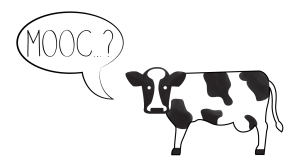 The explosion in MOOCs in recent years has led to renewed attention given to online learning and to approaches to structuring online courses. The emphasis on “connected learning” emanating from our new “ALT Lab” at VCU is shared by many universities in North America and elsewhere. The open learning community has been advocating for some time an approach that emphasizes peer networking, digital literacy, and open publishing. It seems self-evident that we would want our students to have this type of “digital engagement”. The connected courses project, in which VCU faculty have been invited to participate, is exploring the hows and whys of how that can work. This first unit is focusing on “why we need a why”, emphasizing the concept of purpose-driven course design. Coming at course design from the perspective of language learning, it seems evident that there is a built-in expectation for anyone signing up for a language course – namely the desire to learn to function in a new language. I would argue that in today’s internationally intertwined world, and given the volatility of the job market, we need to keep in mind an additional purpose – to have students gain the meta skills and knowledge involved in the process of language learning. The students may not need German in their future but they may need to know what’s involved and how to go about learning a different language they need for work or for personal enrichment.
The explosion in MOOCs in recent years has led to renewed attention given to online learning and to approaches to structuring online courses. The emphasis on “connected learning” emanating from our new “ALT Lab” at VCU is shared by many universities in North America and elsewhere. The open learning community has been advocating for some time an approach that emphasizes peer networking, digital literacy, and open publishing. It seems self-evident that we would want our students to have this type of “digital engagement”. The connected courses project, in which VCU faculty have been invited to participate, is exploring the hows and whys of how that can work. This first unit is focusing on “why we need a why”, emphasizing the concept of purpose-driven course design. Coming at course design from the perspective of language learning, it seems evident that there is a built-in expectation for anyone signing up for a language course – namely the desire to learn to function in a new language. I would argue that in today’s internationally intertwined world, and given the volatility of the job market, we need to keep in mind an additional purpose – to have students gain the meta skills and knowledge involved in the process of language learning. The students may not need German in their future but they may need to know what’s involved and how to go about learning a different language they need for work or for personal enrichment.
Providing that knowledge in online language courses seems to me to be a universal necessity. Central to the experience of an online language course is of course the opportunity for actual use of the language among course participants, along with communicating with learners and/or native speakers online. That can happen in a wide variety of ways today, through both text and video exchanges. Language faculty have been active for quite some time in engaging in telecommunication projects, whether they be group exchanges or individually based through tandem learning. Building relationships that go beyond a course structure is crucial in finding partners for long-term language maintenance, especially important for less commonly taught languages, for which local conversation partners are unavailable. Being able to document ones language ability and achievements has also been an integral component of language learning in recent years, principally through the use of online portfolios, the best known of which is the European Language Portfolio.
Also needed in a online language learning environment are opportunities to provide some of the basic elements of learning a new language (grammar explanations, sample dialogues, vocabulary development, pronunciation guides, etc.), whether they be supplied through a textbook or through the Web site. I have been advocating for a while the use of open educational resources (OER) whenever possible, such as those available from the University of Texas (Center for Open Educational Resources and Language Learning) or Carnegie-Mellon University (Open Learning Initiative). In that sense, I would argue that for language learning, and likely for other disciplines as well, the connected learning, C-MOOC course design model needs to be supplemented by the content delivery that is central to the so-called x-MOOC model, represented by mainstream MOOC aggregators such as Coursera or Udacity. This is articulated in a recent column I wrote for Language Learning & Technology, Global Reach and Local Practice: The Promise of MOOCs. I would argue that when it comes to online learning we should not be using a one size fits all mindset, but rather be eclectic in our approach, taking from different models what makes sense for the discipline, for the level of instruction, and for the needs and desires of our students.
